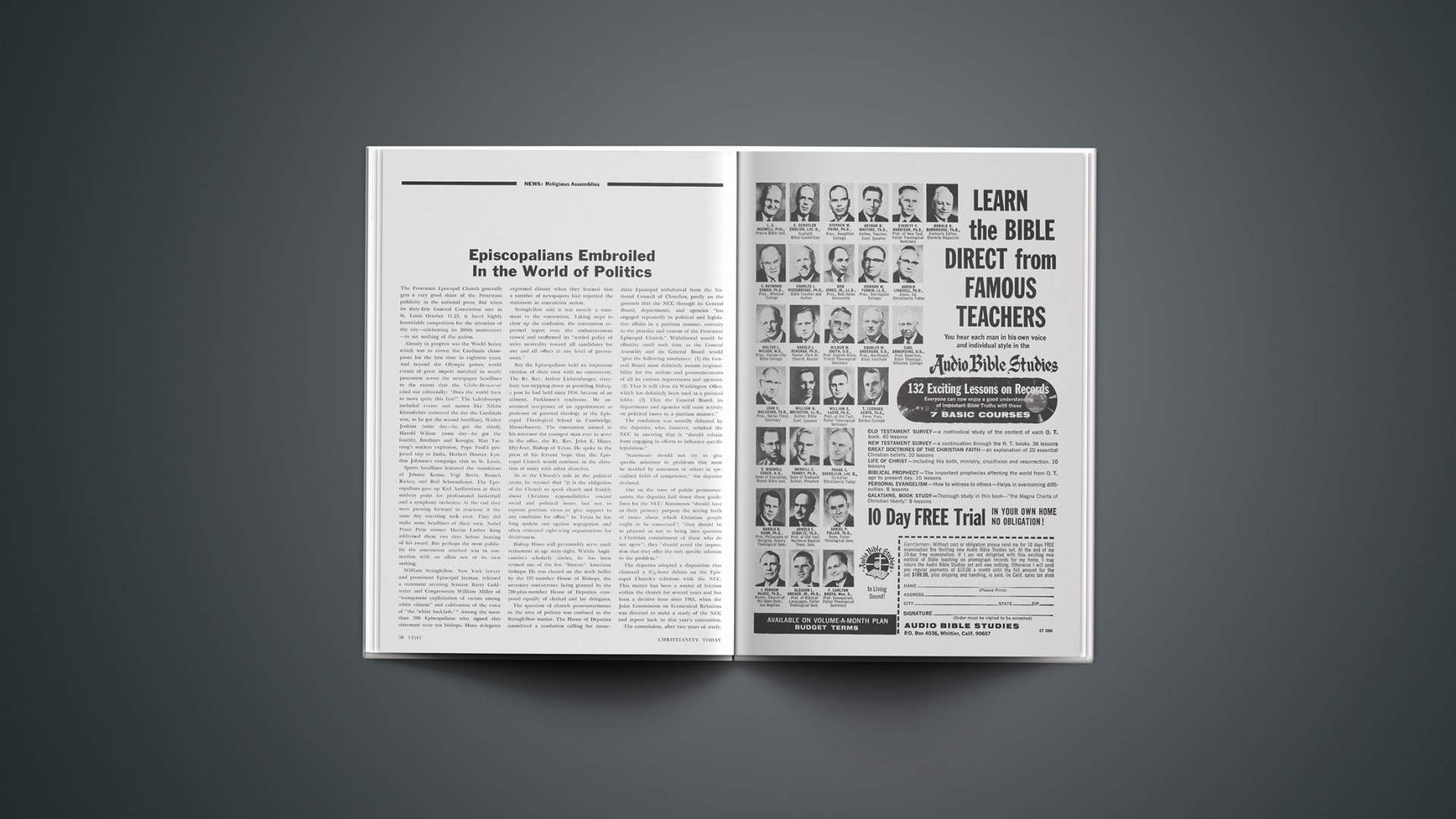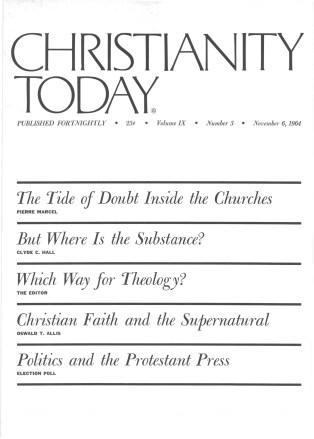The Protestant Episcopal Church generally gets a very good share of the Protestant publicity in the national press. But when its sixty-first General Convention met in St. Louis October 11–23, it faced highly formidable competition for the attention of the city—celebrating its 200th anniversary—to say nothing of the nation.
Already in progress was the World Series, which was to crown the Cardinals champions for the first time in eighteen years. And beyond the Olympic games, world events of great import marched in steady procession across the newspaper headlines to the extent that the Globe-Democrat cried out editorially: “Does the world have to move quite this fast?” The kaleidoscope included events and names like Nikita Khrushchev (removed the day the Cardinals won, so he got the second headline), Walter Jenkins (same day—he got the third), Harold Wilson (same day—he got the fourth), Brezhnev and Kosygin, Mao Tse-tung’s nuclear explosion, Pope Paul’s projected trip to India, Herbert Hoover, Lyndon Johnson’s campaign visit to St. Louis.
Sports headlines featured the transitions of Johnny Keane, Yogi Berra, Branch Rickey, and Red Schoendienst. The Episcopalians gave up Kiel Auditorium at their midway point for professional basketball and a symphony orchestra. At the end they were pressing forward to evacuate it the same day wrestling took over. They did make some headlines of their own. Nobel Peace Prize winner Martin Luther King addressed them two days before hearing of his award. But perhaps the most publicity the convention received was in connection with an affair not of its own making.
William Stringfellow, New York lawyer and prominent Episcopal layman, released a statement accusing Senator Barry Goldwater and Congressman William Miller of “transparent exploitation of racism among white citizens” and cultivation of the votes of “the ‘white backlash.’ ” Among the more than 700 Episcopalians who signed this statement were ten bishops. Many delegates expressed dismay when they learned that a number of newspapers had reported the statement as convention action.
Stringfellow said it was merely a statement to the convention. Taking steps to clear up the confusion, the convention expressed regret over the embarrassment caused and reaffirmed its “settled policy of strict neutrality toward all candidates for any and all offices at any level of government.”
But the Episcopalians held an important election of their own with no controversy. The Rt. Rev. Arthur Lichtenberger, sixty-four, was stepping down as presiding bishop, a post he had held since 1958, because of an ailment, Parkinson’s syndrome. He announced acceptance of an appointment as professor of pastoral theology at the Episcopal Theological School in Cambridge, Massachusetts. The convention named as his successor the youngest man ever to serve in the office, the Rt. Rev. John E. Hines, fifty-four, Bishop of Texas. He spoke to the press of his fervent hope that the Episcopal Church would continue in the direction of unity with other churches.
As to the Church’s role in the political arena, he stressed that “it is the obligation of the Church to speak clearly and frankly about Christian responsibilities toward social and political issues, but not to espouse partisan views or give support to any candidate for office.” In Texas he has long spoken out against segregation and often criticized right-wing organizations for divisiveness.
Bishop Hines will presumably serve until retirement at age sixty-eight. Within Anglicanism’s scholarly circles, he has been termed one of the few “literate” American bishops. He was elected on the sixth ballot by the 197-member House of Bishops, the necessary concurrence being granted by the 700-plus-member House of Deputies, composed equally of clerical and lay delegates.
The question of church pronouncements in the area of politics was confined to the Stringfellow matter. The House of Deputies considered a resolution calling for immediate Episcopal withdrawal from the National Council of Churches, partly on the grounds that the NCC through its General Board, departments, and agencies “has engaged repeatedly in political and legislative affairs in a partisan manner, contrary to the practice and custom of the Protestant Episcopal Church.” Withdrawal would be effective until such time as the General Assembly and its General Board would “give the following assurances: (1) the General Board must definitely assume responsibility for the actions and pronouncements of all its various departments and agencies. (2) That it will close its Washington Office, which has definitely been used as a political lobby. (3) That the General Board, its departments and agencies will cease activity on political issues in a partisan manner.”
The resolution was soundly defeated by the deputies, who, however, rebuked the NCC in asserting that it “should refrain from engaging in efforts to influence specific legislation.”
“Statements should not try to give specific solutions to problems that must be decided by statesmen or others in specialized fields of competence,” the deputies declared.
Also on the issue of public pronouncements, the deputies laid down these guidelines for the NCC: Statements “should have as their primary purpose the setting forth of issues about which Christian people ought to be concerned”; “they should be so phrased as not to bring into question a Christian commitment of those who do not agree”; they “should avoid the impression that they offer the only specific solution to the problem.”
The deputies adopted a disposition that climaxed a 2½-hour debate on the Episcopal Church’s relations with the NCC. This matter has been a source of friction within the church for several years and has been a divisive issue since 1961, when the Joint Commission on Ecumenical Relations was directed to make a study of the NCC and report back to this year’s convention.
The commission, after two years of study, released its report in January. It urged increased participation in the NCC “as a means to strengthen the Christian influence in American and world society” and flatly stated that alleged charges of Communism against the NCC were “false.”
The bishops concurred with the deputies’ resolution on the NCC, but made an addition. The deputies had urged “our representatives to the National Council of Churches to seek to restrain the NCC and its departments and agencies from efforts to influence specific legislation,” and the bishops added the phrase, “except where issues are involved on which this Church has taken a stand through the General Convention, the House of Bishops or the Executive Council.” The deputies concurred.
In a major action concerning the future of their church, both houses adopted, substantially without change, resolutions proposed by the Committee on Mutual Responsibility which in effect embraced the challenge of the Anglican Congress meeting in Toronto in 1963 to recognize the interdependence of every church of the Anglican Communion. The resolutions adopted called upon the Episcopal Church to undertake “without delay” the evaluation and reformation of the church’s response to missions. A commission to be named the Mutual Responsibility Commission will be established to carry out the proposals. In addition, the resolutions call for the Episcopal Church to undertake projects totaling $6,000,000 during the next three years, over and above the budget for the general church program.
Of particular interest in view of the Second Vatican Council’s wrestling with the problem of Jewish guilt for Christ’s death was the strong statement on the subject adopted by this convention. The charge of deicide against the Jews was rejected and anti-Semitism was condemned. The convention also condemned “un-Christian accusations against the Jews.”
The corporate action of both houses came upon the heels of an early position paper on the subject issued by the bishops, which said that the charge of deicide against the Jews was “a tragic misunderstanding of the inner significance of the crucifixion.”
The bishops also emphasized that the crucifixion of Jesus was by some Roman soldiers at the instigation of some Jews and should not impute “corporate guilt to every Jew in Jesus’ day, much less the Jewish people in subsequent generations.”
“Simple justice alone,” the bishops said, “proclaims the charge of a corporate and inherited curse of the Jewish people to be false.… All men are guilty of the death of Christ, for all have in some manner denied Him; and since the sins that crucified Christ were common human sins, the Christian knows that he himself is guilty.”
Racial issues played a large part in the proceedings of the triennial convention. The deputies rejected a statement of Christian conscience that urged the Episcopalians to react against laws or special customs which are “in basic conflict with the concept of human dignity unto God.” Lay rather than clerical deputies cast the decisive votes.
The bishops later re-opened the racial issue by unanimously adopting a strong statement proclaiming that “racial discrimination, segregation or the exclusion of any person in the human family because of race from the rights and activities of the church … are contrary to the mind of Christ and the Church which is His body.” (The deputies later concurred.) The bishops were cognizant of the report that Federal Judge Thurgood Marshall, the only Negro member of the eight-member deputation from the Diocese of New York, bolted the convention in anger for what he branded “conservative and obstructionist” tactics on the part of the lay deputation in handling measures dealing with race issues.
The bishops later issued a statement endorsing civil disobedience in situations where existing laws deny “eternal and immutable laws.”
Bishop Henry Louttit, who had been nominated for presiding bishop, surprised some of the press corps with the statement: “I really believe the cause of Negroes’ rights is set back every time Northern demonstrators come in.”
Other convention highlights included:
• Exchange of greetings and good wishes between Bishop Lichtenberger and Pope Paul. This was the first Episcopal convention attended by Roman Catholic observers.
• Response by the House of Bishops to Bishop James A. Pike’s theological contention that the doctrine of the Trinity is a meaningless form of expression of the Christian faith. “As bishops we are obligated by oath to hold and proclaim that Faith,” the bishops’ corporate statement said. It also affirmed the right of bishops and priests to relate “the Christian Faith to the growth of human thought and knowledge, and the part that individuals play in this process.”
• Probable resolution of an issue that goes back to 1789: Should the church be called Episcopal or Protestant Episcopal? Heretofore, only the longer name was official; this year it was tentatively decided to recognize both. Final approval is expected to come at the General Convention in 1967.










